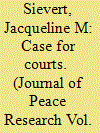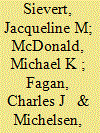| Srl | Item |
| 1 |
ID:
162457


|
|
|
|
|
| Summary/Abstract |
Authoritarian regimes are not known for adopting independent courts, yet the frequency of states empowering their judiciaries has steadily increased. In 1961 only 9% of autocracies had a partially or fully independent court, but by 1987 more than one-third of authoritarian states had reformed their judiciaries. Initiating judicial reform is risky for a regime that seeks to maintain its authority over its populace, including risks to their preferred policy positions and judgments that run contrary to the preferences of the regime. Given these risks, why do authoritarian leaders often relinquish authority to independent courts? This article argues regime leaders will choose to empower at least nominally independent courts in order to resolve information problems that lead to bargaining failures and civil war. This project uses propensity score matching to account for the complex relationship between institutional arrangement and civil war, and finds that states that adopt an independent court reduce their risk of civil war between 54% and 75% when compared to states that are equally likely to have adopted an independent court, but did not. These results suggest that leaders seeking to reduce uncertainty when bargaining with potential oppositions groups have strong incentives to implement independent judiciaries, and improve our understanding of how and why authoritarian leaders choose to delegate authority to independent judicial institutions.
|
|
|
|
|
|
|
|
|
|
|
|
|
|
|
|
| 2 |
ID:
149363


|
|
|
|
|
| Summary/Abstract |
Do non-graded, one-time, short presentations by a panel of professors on foreign policy issues affect voting behavior among students? Did the panel itself contribute to students’ understanding of the importance of foreign policy in evaluating candidates? Did presentations lead to changes in students’ candidate preferences? And, finally, did the event lead to sustained changes in students’ preferences? We find that even though issues of foreign policy tend not to be front and center in American elections, when young voters are presented with information about candidate’s foreign policy positions, as we did in this study, it does seem to have an impact on which candidate they plan on voting for.
|
|
|
|
|
|
|
|
|
|
|
|
|
|
|
|